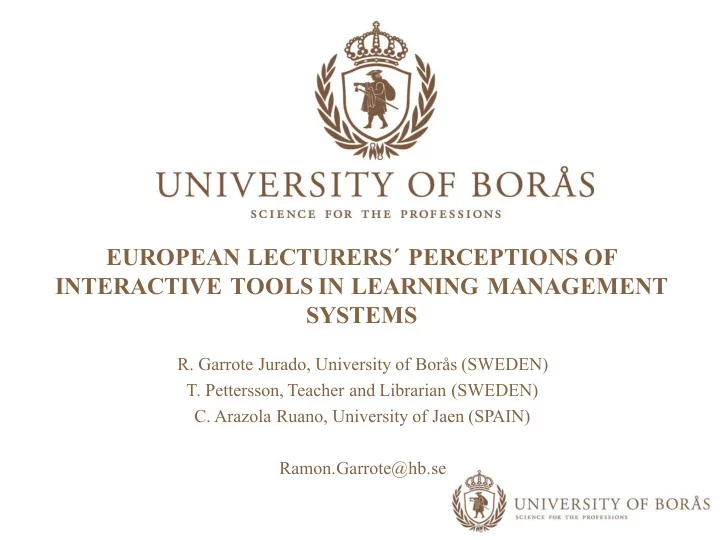

EUROPEAN LECTURERS´ PERCEPTIONS OF INTERACTIVE TOOLS IN LEARNING MANAGEMENT SYSTEMS R. Garrote Jurado, University of Borås (SWEDEN) T. Pettersson, Teacher and Librarian (SWEDEN) C. Arazola Ruano, University of Jaen (SPAIN) Ramon.Garrote@hb.se
COMPUTER SUPPORTED ¡EDUCATION
EDUCATIONAL SOFTWARE q Tools for distribution of documents allow lecturers to upload documents and make them available • for the students (i.e. text documents, media files). q Tools for communication allow information to go either way as well as from student-to- • student (i.e. E-mail). q Tools for interaction call for reaction and feedback (discussion boards, wikis etc.) • q Tools for course management tools that are primarily intended to monitor and document the • educational process, rather than facilitate teaching or learning
THE ¡BENEFITS ¡OF ¡INTERACTIVE ¡TOOLS ¡ According to constructivist theories of learning interactive and collaborative methods can: q Promote group identity and facilitate peer support and recognition. q Enhance the students intellectual maturation and personal development. q Teach students to exercise freedom of expression in a responsible and constructive way. q Enable universities to promote democratic values and hence justify academic freedom.
LECTURERS’ ¡ATTITUDES ¡AND ¡THEIR ¡USE ¡OF ¡ EDUCATIONAL ¡SOFTWARE q This study compares the use of Learning Management Systems (LMS) at two universities; University of Borås, Sweden and University of Jaen, Spain. q Focus was on Online Asynchronous Discussions (OAD). q About 100 lecturers responded to our questionnaire.
MAJOR ¡FINDINGS q In both countries interactive tools are used sparingly, only a few lecturers and students use OAD and other tools for interaction routinely. q There are only small differences in the actual use of LMS between Sweden and Spain. q The lecturers in Spain are more positive to mandatory use of online discussion as a pedagogical tool than lecturers in Sweden. q Lecturers in arts and humanities are more positive to the use of interactive tools than those in the STEM field.
BARRIERS ¡TO ¡A ¡WIDER ¡USE ¡OF ¡TOOLS ¡FOR ¡ INTERACTION q Demands from government that higher education must be justified by impact on economic growth. q A view of knowledge as a marketable commodity. q A view of education that concentrates on transmitting the subject specific and testable content of a course. q A view of knowledge as something memorized and tested to provide the basis for the awarding of diplomas. q Under this paradigm of education, interaction and collaborative learning is of little interest to the universities or to the students.
THE ALTERNATIVE ¡VIEWPOINT ¡ q In social constructivist theories of learning knowledge is something created by the learner in a process stimulated by interaction with other people. q Higher education is a tool for intellectual development and personal growth, not just training for some career. q Under this paradigm both lecturers and students can appreciate the benefits of collaboration and interaction.
THE ¡PURPOSE ¡OF ¡UNIVERSITIES q We prepare for the future by learning how to think, not memorizing what to think. q We test and refine our thoughts only by exposing them to fierce critique and seriously consider alternative ideas. q By promoting public debate and facilitating freedom of expression in a responsible and constructive way universities can justify academic freedom in a democratic society.
Thank you! Questions? 10
Recommend
More recommend